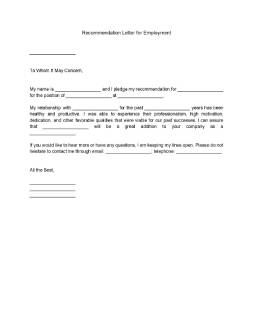- Eviction Notice Forms
- Power of Attorney Forms Forms
- Bill of Sale (Purchase Agreement) Forms
- Lease Agreement Forms
- Rental Application Forms
- Living Will Forms Forms
- Recommendation Letters Forms
- Resignation Letters Forms
- Release of Liability Agreement Forms
- Promissory Note Forms
- LLC Operating Agreement Forms
- Deed of Sale Forms
- Consent Form Forms
- Support Affidavit Forms
- Paternity Affidavit Forms
- Marital Affidavit Forms
- Financial Affidavit Forms
- Residential Affidavit Forms
- Affidavit of Identity Forms
- Affidavit of Title Forms
- Employment Affidavit Forms
- Affidavit of Loss Forms
- Gift Affidavit Forms
- Small Estate Affidavit Forms
- Service Affidavit Forms
- Heirship Affidavit Forms
- Survivorship Affidavit Forms
- Desistance Affidavit Forms
- Discrepancy Affidavit Forms
- Guardianship Affidavit Forms
- Undertaking Affidavit Forms
- General Affidavit Forms
- Affidavit of Death Forms
Employer Recommendation Letter
From investing in different methods of job postings to interviewing and assessing potential employees, the recruitment process is taxing for the recruiters. This is why recruiters require several documents that will be evaluated during the process of evaluating the applicant. Among high-ranking positions, a recommendation letter can make or break the applicant’s chance to get the job. The document contains essential information about the applicant that is not available on the person’s transcript and resume. Continue reading this article to know more about the importance of a well-written and compelling employment recommendation letter. Read More
Employer Recommendation Letter
What Is an Employer Recommendation Letter?
Supervisors, managers, trainers, or anyone who has a direct subordinate has the chance the write an employment recommendation letter. The direct supervisor is assumed to know the work ethic of their subordinates in-depth within the workplace. The recommendation letter, expectedly, contains the reasons you will recommend your former colleague for a new job. The document ought to provide praises and positive evaluations regarding the applicant’s attitude and overall work ethic. Aside from expressing your support, introducing your credentials can also help build the strength of the recommendation.
How Do You Create an Employer Recommendation Letter?
One supervisor or manager is often the one to write several recommendation letters for different people applying for varied job positions. The number can overwhelm an individual, and it can be confusing. To avoid mix-ups, some resort to using ready-made templates that reflect their thoughts and recommendations regarding a particular former employee.
1. Ask for the Applicant’s Other Necessary Documents
Writing a recommendation letter becomes difficult when you already have a vague memory of your work dynamics with the applicant. One way to juggle is to ask for essential pieces of information from the applicant. You can choose to ask for the documents that they submitted to the other material. These documents may include their transcript, resume, and even their resignation letter. Also, do not forget to double-check the position that they are applying for. Your statements of recommendation must support why the applicant is best for the role based on past experiences.
2. Introduce Your Merits
The best way to introduce any recommendation letter is to place your name, affiliation, and credentials in the line. These details alone can significantly affect the merit of the recommendation. These pieces of information also make the start of the letter strong and firm. Apart from the brief introduction, do not forget to state your recommendation for the applicant. The juxtaposition of these statements can further sway the decision of the recruitment team to hire the applicant.
3. Describe Your Experience
A recommendation letter must be short and straightforward. After the brief introduction, the next paragraph must contain the reasons you recommend the applicant for another job. Make sure to highlight the applicant’s skills and abilities that will be helpful for their new position. Keep in mind that your statements must provide evidence on why the applicant is the best choice for the job. Say, for example, the applicant is vying for a human resource assistant post. Assess the core qualities of an HR assistant and see if the applicant has the qualities that exemplify any of the necessary core qualities. A streamlined recommendation letter increases the percentage of the applicant’s success.
4. Keep Your Lines Open
The ending note of the letter must acknowledge your openness for further communication with the recipient of the letter. With this declaration, you must include your working contact number and email address. Moreover, if your schedule is tight, you can consist of an amenable timeframe declaring when you will be receiving calls and inquiries about the document. The aim of these subsequent calls is usually to dig deeper into the recommendation statement. Furthermore, the recruiter may also use this opportunity to cross-examine the claims of the applicant, especially if the individual is applying to aim for a managerial position or higher.
5. Maintain a Professional Tone
A recommendation letter is one of the many forms of a business letter. As such, the message must also maintain the formality that is required from a business letter. From the introduction down to the salutation, the writer must maintain a professional tone even when narrating personal experiences with the applicant as it remains to show professional experiences. To maintain the desired professional tone, be careful with the words you choose. Use non-discriminatory language and be courteous, but be confident. Confidence makes the entire message more plausible.
FAQs
1. How important are employer recommendation letters?
A well-written recommendation letter from a previous employer provides insight into the capabilities and other strengths of the applicant. These insights are also the pieces of information that cannot be seen on the applicant’s resume and cover letter. It also builds and creates a clearer picture of the applicant’s potential.
2. When should I ask for a recommendation letter?
Although it is important to note the position that you are applying for when asking your former employer to write the letter, it is also advisable to ask for the letter as soon as you leave the position. In these cases, the employer often indicates that the validity of the recommendation stands for whatever position the applicant is vying for.
3. How do I address a recommendation letter?
In addressing the letter, you must use the name provided by the applicant. It can either be the name of the head of the human resources department or the recruiter. If the name is not available, you can use the name of the company.
4. What makes a great recommendation letter?
Business documents such as immediate resignation letters and recommendation letters need to be short and direct to the point. To come up with a great recommendation letter, it must be articulate and clear. In short, the reader must not doubt the message of the document.
5. How to request a recommendation letter?
The best way to request a recommendation letter is to send a formal request through email or written notice. You can also choose to talk to your former employer personally.
Recruiters are flooded with several job application letters every day. Systems and methods are created to sift through these applications to recruit the best person for the job. They require several documents from the applicant, and one of the most critical ones is a recommendation letter. A recommendation letter from a former employer is the best choice for applicants who are applying for higher ranking positions. This letter builds on their competence and confidence, as someone is willing to vouch for their name.

